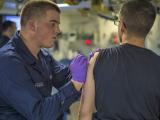Mar 27, 2003 (CIDRAP News) Federal health officials revealed today that 12 people10 military personnel and 2 civilianshave had heart inflammation after getting smallpox shots, strengthening evidence that the vaccine can cause such inflammation.
In addition, officials reported that a second civilian vaccinee has died of a heart attack within weeks after receiving the shot. But they said it remains unclear whether the coronary artery events seen in five civilians are related to the vaccine. The second victim was a 57-year-old woman who died yesterday, 10 days after a heart attack. Another recently vaccinated woman, aged 50, died of a heart attack Mar 23.
The Centers for Disease Control and Prevention (CDC) announced yesterday that people with known heart disease should avoid smallpox vaccination until authorities can determine if the vaccine increases the risk of cardiac events. The announcement was based on reports of heart problems in seven civilian vaccinees, including three heart attacks, two cases of angina, and two cases of myopericarditis.
CDC today reported the military myocarditis cases and the death of the second heart-attack patient in a press briefing and in the online edition of Morbidity and Mortality Weekly Report. The agency said 10 military personnel had had mild myocarditis within 6 to 12 days after receiving a smallpox shot. They were all first-time vaccinees, and all recovered completely, according to the MMWR report. The two civilians who had myocarditis also had improved or recovered, officials said.
"Data from the military smallpox vaccination program are consistent with a causal association between vaccination and myopericarditis, although this association is not proven," the report states. Consequently, the report says candidates for vaccination "should be informed that myopericarditis might be associated with smallpox vaccination and that they should seek medical attention if they develop chest pain, shortness of breath, or other symptoms of cardiac disease" afterward.
So far, CDC does not know of any risk factors for experiencing myocarditis after a smallpox shot, said Walter Orenstein, MD, head of the agency's National Immunization Program.
In addition to the two women who died, the civilian vaccinees who had coronary artery events included a 54-year-old woman who had a myocardial infarction (MI), a 43-year-old woman who had angina attributed to a tortuous coronary artery, and a 60-year-old man who had angina attributed to a coronary artery occlusion.
Given the size of the civilian vaccination program and the prevalence of CAD, the MIs and angina cases could be unrelated to the vaccine, Orenstein said. "The numbers we have to date are within what we might expect by chance alone," he said.
More than 25,000 civilians have received smallpox shots so far. Assuming the shots did not increase cardiac risk, one to two cardiac-associated deaths would be expected to occur anyway within 3 weeks after vaccination among those aged 45 to 64 years, according to the MMWR report.
For now, vaccination is contraindicated only for people with known heart disease, not for those who simply have coronary artery disease (CAD) risk factors, Orenstein said. "If you look at all the known risk factors for CAD, you would potentially get very very large numbers of the population [excluded from vaccination]. It would be very difficult to enhance preparedness," he said.
Cardiac inflammation associated with smallpox vaccine has been reported previously in Europe and Australia, but it had not been seen with the strain of vaccinia used in US smallpox vaccines, according to Orenstein. "Cardiac problems were not a scientifically accepted adverse event with smallpox vaccine in the United States," he said.
The MMWR report says a study of vaccinia-associated deaths from 1959 to 1966 and in 1968 did not identify any deaths involving heart complications. However, it also says the current civilian vaccination program may differ from past experience because more older people with underlying heart disease and cardiac risk factors are getting shots. Also, today's diagnostic tests are more sensitive, possibly leading to the detection of more MIs.
Orenstein said CDC is developing interim screening criteria related to the recommendation to exclude heart patients from vaccination. Tomorrow, he said, the CDC's Advisory Committee on Immunization Practices and the Armed Forces Epidemiologic Board will meet to discuss the situation.
See also:
CDC. Cardiac adverse events following smallpox vaccinationUnited States, 2003. MMWR 2003 Mar 28;52(12):248-50 [Full text]
CDC press briefing transcript
http://www.cdc.gov/media/transcripts/t030327.htm



















